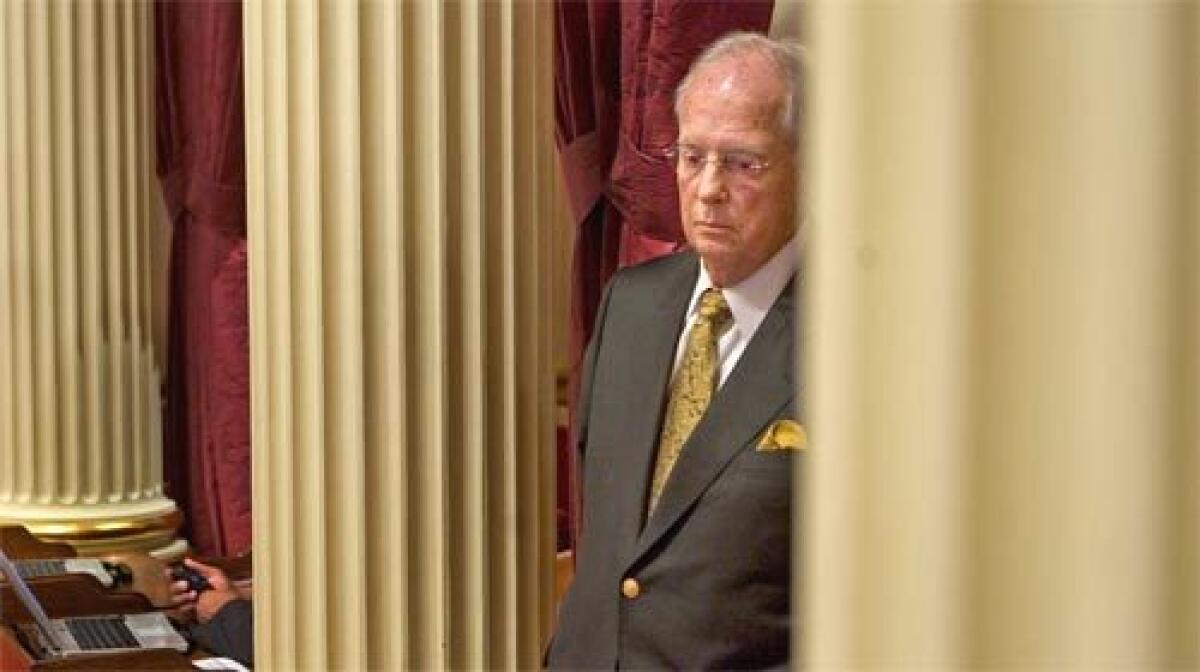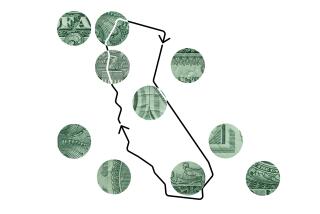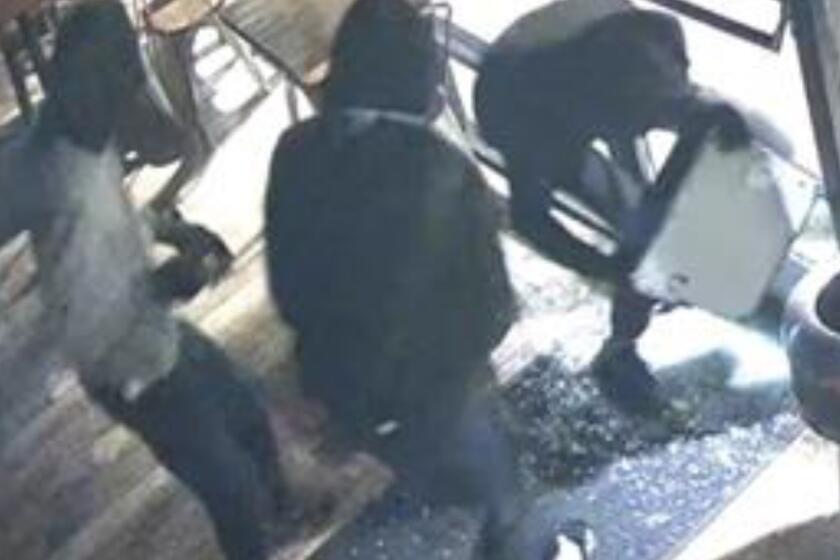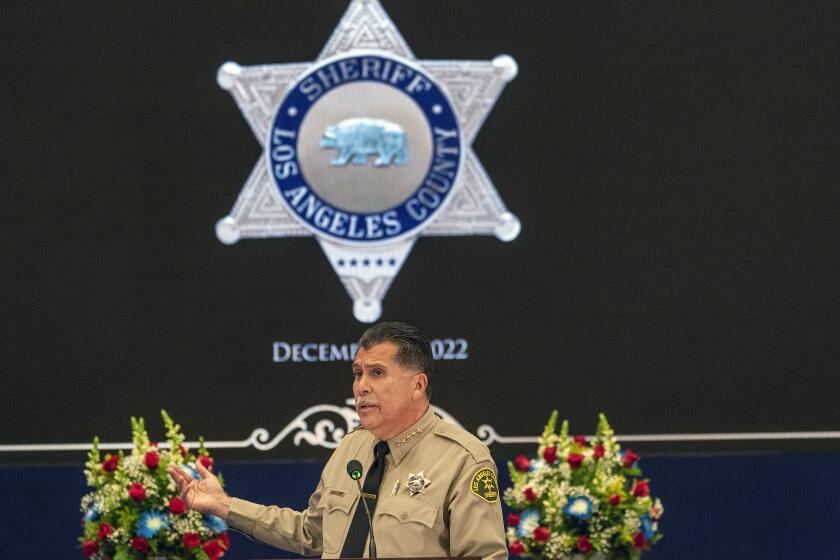Donor money talks, often in a whisper

A massage for a lawmaker’s wife. Circus tickets for his kids. Keys to a mountain cabin for the weekend. A donation to his favorite charity or one that flies him across the world on an “educational” trip.
There are many ways to get a politician’s attention. Plenty of corporations, unions and others with a stake in state government do it the time-honored way: They write checks to campaign accounts or wine and dine lawmakers. But voters have restricted how much can be spent on such things.
FOR THE RECORD:
Political money: An article in Section A on Dec. 29, about ways in which special interest money is used, misidentified a nonprofit group that took state political leaders on a study tour to South America in November 2006. The group that sponsored the trip was the California Foundation on the Environment and the Economy, not the California Council for Environmental and Economic Balance. The article also said Chevron and its subsidiaries donated $343,000 to the council in 2006; in fact, that sum was given during 2005 and 2006. Chevron also donated to the foundation last year, but the company and foundation officials —who are not required by law to disclose the donations -- declined to specify how much.
These days, interest groups and wealthy individuals hoping to generate goodwill in the Capitol are doing more creative things, too. They still wine and dine, but they have found loopholes through which they also dispense money for a lawmaker’s favorite cause, bestow lifestyle perks such as luxurious travel -- even provide them with outside income.
“Water flows into the cracks,” said UC Berkeley political scientist Bruce Cain. “People have had to become more ingenious.”
This year’s limit on gifts to legislators, for example, is $390. But gifts to their spouses don’t count. So in September, life and health insurance companies could buy $682 in meals for Maggie Cox, wife of Sen. Dave Cox (R-Fair Oaks), at a Pebble Beach conference they both attended.
Under California law, gifts must be disclosed in public filings with the secretary of state.
Nevertheless, largesse from special interests trying to create familiarity and goodwill in the Capitol is a “pernicious influence,” said Robert C. Fellmeth, executive director of the Center for Public Interest Law at the University of San Diego Law School.
Fellmeth has worked for 30 years on legislation to benefit children and consumers without giving state campaign contributions or gifts and has to work “very, very hard” to get an appointment with a lawmaker, he said.
Generosity from interest groups and individuals, he said, can foster in some decision-makers “a desire not to disappoint that extends to every possible future bill.”
“It’s not like a direct bribe,” Fellmeth said. “It’s worse. In a direct bribe, you get a quid and give a quo. And maybe it’s over. But with what we have in Sacramento, there’s no definition to the transaction, there’s no limitation to the transaction.”
Brad Wegner, president of the Assn. of California Life & Health Insurance Companies, host of an annual Pebble Beach conference with legislators, said his group seeks “interaction between policymakers and our members,” and no favor is sought.
“What we get out of it,” said Wegner, “is an exchange of information and the time to share views.”
Dave Cox said the Pebble Beach event does not leave him better disposed toward the insurance companies, noting that he has voted against bills the association supported. No one has special access to him or his staff, he said: “We meet with anyone who wants to meet with us about any subject.”
But Fellmeth said California needs a tighter lid on political money so that special interests cannot buy access to lawmakers. Ideally, legislators would be treated like judges and be barred from discussing legislation with interested parties outside of public hearings, he said. They should also be banned, he added, from taking anything of value from those parties.
“We’ve really got to have a wall of integrity,” he said, “where legislators take nothing from anybody they affect as officials.”
Here are some of the ways special interests curry favor:
Be charitable
Many corporations and unions write generous checks to lawmakers’ favorite charities. AT&T, for example, donated $20,000 last spring to the United Way of the Bay Area in the name of Senate President Pro Tem Don Perata (D-Oakland).
The Barona Band of Mission Indians, owner of a casino near San Diego, takes a slightly different approach. In the last couple of years, the tribe has given $5,000 each to 60 schools across the state.
To be eligible for the Barona Education Grant Program, each school’s application must include a letter of recommendation from a local lawmaker. Not only do the folks in the state Legislature know about the tribe’s good deeds, but many get to hand out the Barona checks to winning school principals.
Give to a pet cause
There are no limits on how much donors can give to campaign committees created to promote or defeat a ballot measure, and the Legislature’s top leaders both have them.
Assembly Speaker Fabian Nuñez (D-Los Angeles), for example, wants to pass Proposition 93 on the February ballot, which would tweak California’s term limits so he could run for the Assembly again next year. Big donations from special interests have poured into his “Yes on Prop. 93” fund: The state’s biggest teachers union and a group of Los Angeles County casinos each kicked in $250,000. Donors of $100,000 or more include several public employee unions, the law firm Girardi & Keese, the California Dental Assn., Chevron Corp. and the Pala Band of Mission Indians.
Last November, Perata had a priority of his own: passage of $43 billion in bonds to upgrade the state’s transportation, flood control, housing and school facilities.
The hundreds of large donors to the bond campaign included four Indian tribes that wanted lawmakers to approve their plans to add thousands more slot machines to their casinos. Each tribe donated $100,000 to Perata’s “Rebuilding California” ballot measure committee.
Dispense freebies
Legislators and their staffs aren’t supposed to accept gifts worth more than $10 a month from lobbyists. But they can accept gifts worth much more from people who aren’t registered as lobbyists. Some interests in the Capitol give a universal gift: The State Building & Construction Trades Council gave $75 black leather portfolios to 39 Assembly Democrats in February 2006.
In March, the Barona gave Assemblyman Tony Mendoza (D-Artesia) a $320 massage and facial at their casino and resort near San Diego. Mendoza’s chief of staff, Luis Patino, received a $135 massage. The tribe also spent $232 to have chocolate-covered strawberries placed in the hotel rooms of nine lawmakers staying at the resort for an education summit.
Others let legislators and staff pick their own goodies. The energy company BP America Inc., which owns a luxury box at Arco Arena in Sacramento, has set up a phone line for Capitol workers to order free tickets to basketball games, concerts, circuses and other events. The phone instructions indicate that only legislators can have somebody call on their behalf, and staff must give their job title and the office where they work. From January through September this year -- the latest required reporting period -- BP gave away $21,301 worth of tickets and parking passes to legislators, staff members and their families.
Pamper families
This year, insurance companies picked up a $951 tab for transportation and meals for Lisa Calderon, wife of Assemblyman Charles Calderon (D-Montebello), at the Pebble Beach conference.
Brother Ron Calderon, a Democratic state senator from Montebello, enjoyed $329 worth of meals, drinks and a movie, according to reports filed by the insurance companies. At the same event last year, when he was in the Assembly, insurers paid $1,084 to treat his wife, Ana, and daughter Jessica to meals and spa services.
When the California Ski Industry Assn. hosts lawmakers, children are welcome. In March, the lobby group paid $2,147 to host five Republican Assemblymen and 19 family members, including several grandkids, at the Strawberry Lodge in Kyburz, east of Sacramento. A free day of skiing at the Sierra-at-Tahoe resort followed.
AT&T spent $101,000 to send lawmakers, legislative staff and their families to rock concerts, wrestling matches and other events, including Giants, Padres and Raiders games.
Help pay for junkets
There’s not much time to get to know a lawmaker at an evening fundraiser at a Capitol watering hole. But on a trip overseas or to a beach in Hawaii, real bonds may form.
Chevron Corp. and its subsidiaries donated $343,000 last year to the California Council for Environmental and Economic Balance, a nonprofit that in November 2006 took Nuñez; Gov. Arnold Schwarzenegger’s chief of staff, Susan Kennedy; and other officials and their spouses or partners to Brazil and Argentina to study alternative energy for two weeks. The delegation stayed at world-class hotels in Buenos Aires and Bariloche. Chevron employees accompanied the lawmakers to South America.
Nuñez reported the trip as a $12,500 “study travel project.” His spokesman, Steve Maviglio, said none of the gifts or donations the speaker receives have any effect on his legislative work.
“There’s an old rule in politics; if you can’t take their money and vote against them, you shouldn’t be in politics,” Maviglio said. “The speaker has a reputation for integrity because none of these things have had any impact on his voting record or political philosophy.”
And each November, Diageo, Pacific Gas & Electric, Eli Lilly and other businesses affected by state legislation help send more than a dozen lawmakers to Maui for a week by donating to a nonprofit group, the Pacific Policy Research Foundation. The foundation books a hotel and arranges a few speakers each morning to discuss the budget, recent elections or other public policy issues, then frees legislators each afternoon to snorkel, swim, shop, golf or schmooze with the many lobbyists who also attend.
Sen. Jeff Denham (R-Salinas) attended last year, and PG&E and the Pechanga Band of Luiseno Indians picked up $300 in golf course fees for him.
Open a mountain getaway
Nuñez reported a gift that he valued at $360 from Los Angeles businessman Eli Broad for “use of apartment” in May 2006. He also disclosed the November 2004 use of a cabin in the Lake Arrowhead area, a visit he valued at $300. The property, he reported, belonged to Larry Flores. Flores is president of El Tapatio Markets.
Nuñez disclosed those gifts on his annual statement of economic interests. But politicians who stay at a home -- or condo or cabin -- while the owner is present do not have to report such sojourns. State law considers these visits “hospitality” and exempts them from disclosure.
Put up a billboard
Last year, after the Legislature passed a Nuñez bill that freed telephone companies to compete with cable companies by offering pay television service, AT&T helped pay for full-page newspaper ads praising the speaker for his “leadership and vision.”
Perata has solicited $530,000 this year from developers, construction unions and other interests for a nonprofit entity called the Rebuilding California Foundation. The purpose of the foundation? To inform the public about the new roads, levees and other works funded by the $43 billion in infrastructure bonds voter passed in November 2006. So far, the foundation’s activities have included paying for billboards around the state that thank Schwarzenegger and local senators for their efforts in crafting the bonds.
Hire him
Unlike Los Angeles City Council members, state lawmakers are not forbidden to take second jobs. They simply must disclose the income.
Through most of 2005, then-Sen. Kevin Murray (D-Los Angeles) worked on a bill to allow the state to build and operate concert halls and sports stadiums and sell naming rights and luxury boxes. In late 2005 and early 2006, he was paid $40,000 as a consultant to Anschutz Entertainment Group, owner of Staples Center and a supporter of the bill (which was ultimately unsuccessful). Murray said his work for AEG had nothing to do with the bill.
Give to his faction
The eight members of California’s Legislative Black Caucus and the 26 members of the Latino Legislative Caucus have reason to feel grateful toward a long list of business interests, including AT&T, Sempra Energy, Kaiser Permanente, Pfizer and Washington Mutual. The businesses donated to both of the separate nonprofits that the black and Latino caucuses created. Their tax-deductible donations help pay for policy retreats, conferences and Capitol student internships.
Corporate executives sit on boards that advise these nonprofits, giving them the opportunity to work hand-in-hand with lawmakers, and their corporate logos appear on the nonprofits’ websites.
More to Read
Start your day right
Sign up for Essential California for news, features and recommendations from the L.A. Times and beyond in your inbox six days a week.
You may occasionally receive promotional content from the Los Angeles Times.






